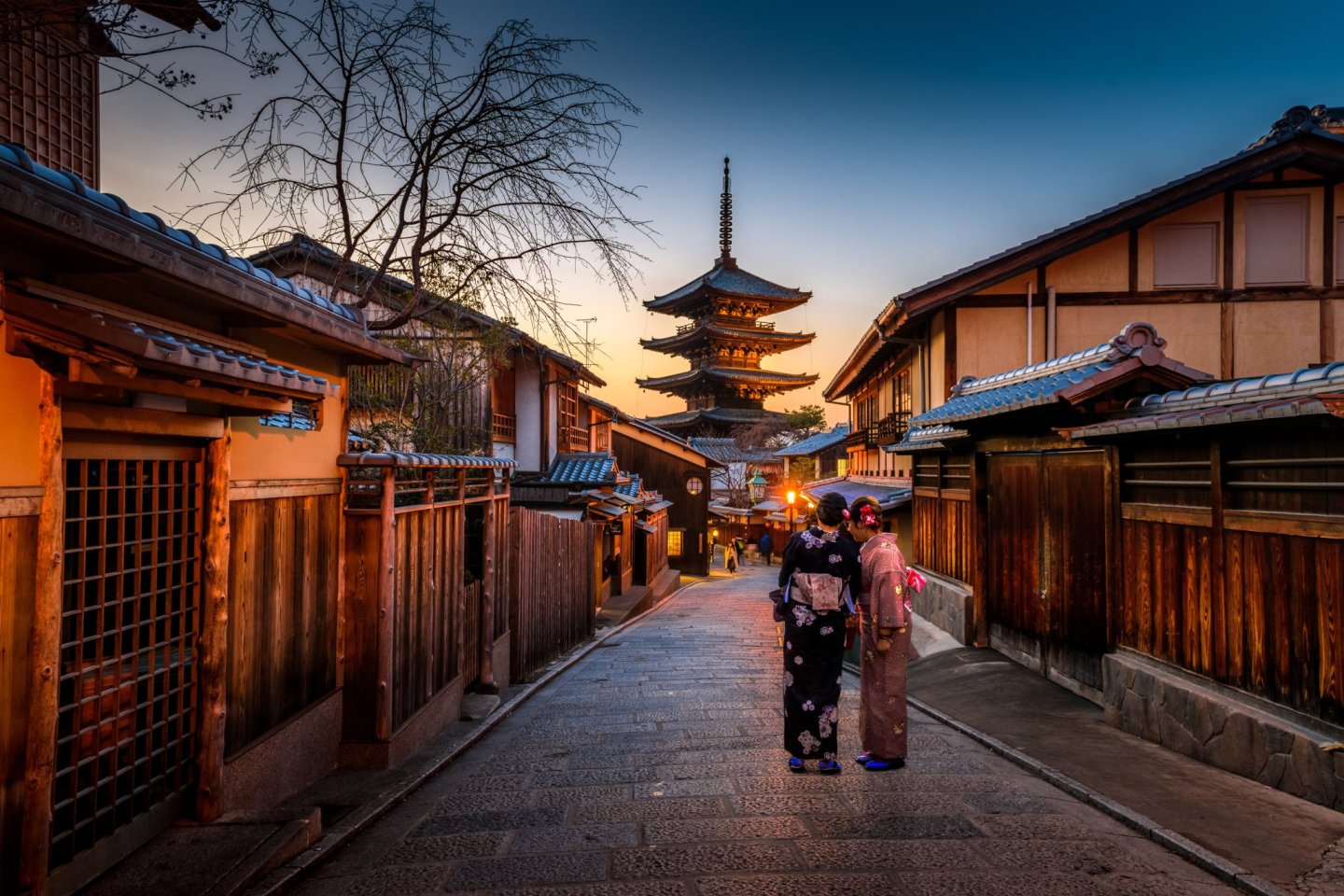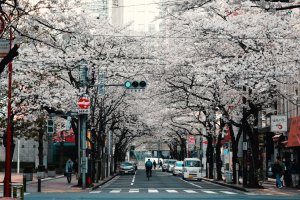Traveling somewhere new comes with a wide mix of emotions – there's often excitement and anticipation of what's to come, combined with some trepidation or anxiousness about being in a completely different country.
Often, that trepidation or anxiety can be eased when you know what to expect, so we've put together a beginners guide to Japan. The goal of this compilation is to answer some of the questions we regularly receive via our social media channels, plus some things our own staff would have liked to know when they first came to Japan!
Where to fly into?
One of the first things to consider when heading to Japan is where you'll be flying into. Many first timers opt to head to Tokyo, which is served by two international airports – Haneda (HND) and Narita (NRT). Something that visitors aren't often aware of is the difference in distance between them. Haneda is located under 20 kilometers from popular tourist areas like Shinjuku and Shibuya, whereas Narita is located in Chiba Prefecture about 80 kilometers away from the heart of Tokyo. Factor this in when you book your flights!

Transport Tips
A question we receive quite regularly is "should I get a JR Rail Pass or not?", and the answer really comes down to how much ground you plan on covering. At the time of writing, the price of a 7 day rail pass is close to 30,000 JPY, and the 14 day pass is just over 47,000 JPY. When you compare the price to a one-way ticket from Tokyo to Kyoto at 13,320 JPY for an unreserved seat, you can see that the pass pays for itself fairly quickly if you're chalking up some kilometers.

If you're basing your stay in Tokyo, one economical way to get around is the Tokyo Metro one-day pass. Priced at ¥600 for adults and ¥300 for children, the pass includes unlimited rides on Tokyo Metro lines for 24 hours from its first use. The passes can be purchased in advance or on the day, with on the day tickets available via ticket machines at all Tokyo Metro stations.
Getting yourself a PASMO or Suica card is another good option if you're predominantly staying in the one locale. These tap-and-go electronic money cards can be used on train and bus networks, plus they can be used as a means of payment at convenience stores, many vending machines, and even some retail outlets. You can find more information about PASMO cards here, and more information about Suica cards here.

Something to note when you disembark at a train station is which exit you should head out from. Many stations have numerous exits, and heading out the wrong one can put you on the opposite side of where you need to be. We recommend checking a map before randomly picking any exit, so you can be closest to your intended destination.
Some people opt to rent a car for their Japan travels, and this guide on our site covers some of the basics you need to know if you're intending to do that. It's also helpful to know how to fuel up a vehicle, and we've got an instruction guide for that here.
Cash or Card?
Unlike some destinations, Japan still has many stores and restaurants that don't offer card payment facilities. Because of this, it's useful to keep some cash on you to avoid being caught out.
While on the topic of cash, Japan doesn't have a culture or custom of tipping. If you do leave cash on a cafe or restaurant table as a tip, it's likely you'll have a staff member chase you down the street to return your money!

Which accommodation option to choose?
Accommodation options in Japan run the gamut, from size to price. Some types to consider include:
- Capsule Hotels: these are small, pod-like structures that basically fit a bed mattress and not much else. At these hotels, bathroom facilities are communal, so keep that in mind if you would prefer more privacy. Capsule hotels can be a great option for solo travelers on a budget, and there are capsule hotel chains who offer male-only or female-only lodging if you would prefer that.

- Business Hotels: There are several different business hotel chains in Japan, including the likes of APA, Route Inn, and Dormy Inn to name just a few. They are typically small in size but clean and conveniently located near stations to cater to their business clientele.

- Love Hotels: Despite their reputation for being places for some *ahem* quality time, love hotels can serve as an inexpensive, clean, and convenient place to stay. Many love hotels offer automated self check-in and check-out options, which is great if you intend to arrive or leave outside standard hours. Some also have quirky decor themes which can be fun if you're looking for something unique.

- Minshuku: Often referred to as Japan's bed and breakfast option, minshuku are a way to enjoy an authentic Japanese experience with your stay. Something to note about minshuku is that it's common for bathroom facilities to be shared between others staying there, so be sure to check when booking if this is something that would bother you.

- International Hotel Chains: There are also numerous international hotel chains to choose from, including the likes of Hilton, Marriott, and Westin to name just a few. If you're after familiarity when it comes to your accommodation, these chains can be a good option.

- Ryokan: these are traditional Japanese inns, and usually come with meals (primarily breakfast and dinner) included with the room rate. If you have allergies or intolerances, it's recommended to advise your ryokan of this ahead of time so they can work to accommodate your preferences.

Best time of year to visit
It's important to mention that the best time of year is going to be different for everyone based on their own personal interests. For instance, one person may hate the cold, another may adore skiing and snowboarding – so winter might be great for one traveler and not so much for others!

Weather-wise, two of the most pleasant times of year to visit are spring and autumn. They're also two times of year with some stunning natural beauty to enjoy in the form of cherry blossoms and changing leaves respectively.
Something to keep in mind when planning your visit is Japan's schedule of national holidays. One time of year that can present challenges for travelers is Golden Week, a string of public holidays running from April 29th until May 5th annually. During this period, many people travel to visit family or plan their own getaways, meaning that roads are congested, trains and flights are often booked well in advance, and accommodation options are often more expensive during this peak timeframe.

Tattoos
What does Japan think about ink? Long story short, tattoos have associations with yakuza (organized crime syndicate members) here, and tattoos are often still prohibited at places like onsen (hot springs), water parks, and even some public beaches.
If you do have tattoos, there are a couple of options. First, if your tattoos are small, some people opt to cover them with waterproof band-aids and try their luck. A safer approach is to visit places that have a more open mindset regarding tattoos, and using a website like Tattoo Friendly Japan to help narrow down those destinations is useful.
If you are particularly enthusiastic about visiting an onsen, opting for a private one can be a stress-free approach with respect to both tattoos and then idea of being naked around a bunch of strangers – the latter is quite an adjustment for visitors from certain countries.

What to do if you're an early riser
One thing becomes apparent in Japan very quickly – many places (cafes, restaurants, supermarkets) don't open until 10am or later. This is where convenience stores come in handy! Three of the major convenience store chains here are 7-11, Lawson, and Family Mart, and they're places where you can grab a morning coffee or tea, full meals and snacks, toiletries, and plenty more.
Once you're fueled up for the day, temples, shrines, and parks are good options to explore bright and early. These places are often open 24 hours (although not in all cases, so be sure to Google your intended destination to double check!) and can provide a serene and culture-filled start to your morning.

Helpful apps and websites
With most of us traveling with smartphones in our pockets, downloading a few apps ahead of time can be particularly handy. Some that we'd recommend include:
- Google Maps – a must for getting from A to B, pinning spots you'd like to visit, and even working out which trains to catch. Pop your departing station and arriving station into the app, tap the transit icon, and voilà – you've got the routes right in front of you.
- Google Translate – this comes in super handy for things like deciphering restaurant menus or being able to ask someone for help if you don't speak Japanese. If you download the offline version ahead of time you'll still be able to translate things without an internet connection.
- Gurunavi – this website makes picking somewhere to eat a breeze. You can filter by the area you're visiting and the type of cuisine you're seeking, and it will provide a variety of results. There is also an app version, but at the time of writing it is only available in Japanese.
- Halal Friendly Japan – if you're Muslim and looking for halal eateries during your visit, download Halal Friendly Japan. The app helps you find halal restaurants and cafes based on your destination.
- Happy Cow – This website (also available in app form) is useful for vegan and vegetarian travelers looking for plant-based places to eat.

Staying connected on your visit
Another regular question we get asked is how to stay connected during your travels. There are three main options – SIM cards, eSIMs, or portable WiFi devices – and there are several companies that provide those services. For sim cards, Mobal is one convenient choice, and they offer various plan lengths with different features.
Portable WiFi is another popular way to stay online, and there are numerous companies that offer these devices. Checking the website of the airport you're flying into can be helpful in establishing where to find either SIM card providers or portable WiFi devices, for instance:
- Tokyo Haneda SIM + Portable Wifi Services
- Tokyo Narita SIM + Portable Wifi Services
- Kansai Airport SIM + Portable Wifi Services
































I Think Google Maps will be the most practical way to find travel information now that Hyperdia has become pretty much useless?